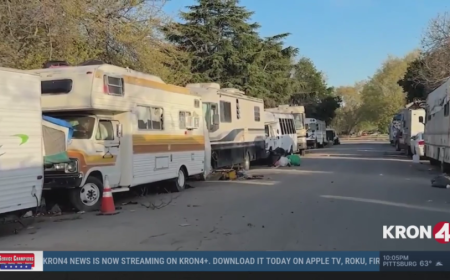Trump Allies Threaten to Imprison San Diego Officials Who Fight Mass Deportations
After San Diego County took steps earlier this month to strengthen safeguards for undocumented residents, an organization led by President-elect Donald Trump’s adviser Stephen Miller sent a letter warning that elected leaders and employees of “sanctuary” jurisdictions could be “criminally liable” if they impede federal immigration enforcement.



California’s southern border, long ‘ground zero’ in the fight between federal and local officials over immigration policy, is now at the center of renewed controversy over how far local leaders can go to protect people from deportation.
After San Diego County took steps earlier this month to strengthen safeguards for undocumented residents, an organization led by President-elect Donald Trump’s adviser Stephen Miller sent a letter warning that elected leaders and employees of “sanctuary” jurisdictions could be “criminally liable” if they impede federal immigration enforcement.
In the Dec. 23 letter, America First Legal Foundation wrote: “We have identified San Diego County as a sanctuary jurisdiction that is violating federal law.”
The conservative legal nonprofit that day announced that it had identified 249 elected officials in sanctuary jurisdictions who it said could face “legal consequences” over immigration policies. The California Attorney General’s office and Los Angeles Mayor Karen Bass were sent similar letters.
The letter also suggests sanctuary city officials could be civilly liable under federal anti-racketeering laws.
With Trump pledging to carry out the “largest mass deportation campaign in U.S. history,” San Diego’s board of supervisors enacted a policy on Dec. 12 prohibiting local law enforcement from communicating with immigration authorities about undocumented people in local jails without a judicial warrant.
San Diego’s newly enacted ordinance goes a step further than California’s existing state “sanctuary” law, which only limits cooperation between local law enforcement and the federal Immigration and Customs Enforcement. The law prevents jailers from notifying ICE about non-citizen inmates who are about to be released from local criminal custody unless they committed one of about 800 serious crimes. State prison officials regularly communicate with ICE about people in their custody, including U.S. citizens, public records show.
San Diego County’s action faced immediate pushback, with the county’s top law enforcement official, Sheriff Kelly Martinez, saying she would not follow the new policy and would continue allowing immigration authorities access to the jail inmates.
American First Legal Foundation sent its letter to the chair of San Diego County’s Board of Supervisors, Nora Vargas, who stepped down from her position on Friday citing security concerns just weeks after being elected to a second term.
“Federal law is clear: aliens unlawfully present in the United States are subject to removal from the country, and it is a crime to conceal, harbor, or shield them. It is also a crime to prevent federal officials from enforcing immigration law,” states the letter, dated three days after the resignation.

Vargas, who was born in Tijuana, has long championed rights for asylum seekers and immigrants. She was the first immigrant and Latina to serve on San Diego’s board of supervisors. She was elected to the board in 2020, flipping the seat from Republican to Democrat for the first time in decades.
Vargas said the new board policy was developed through “rigorous legal review and stands in full compliance with federal, state and local laws.”
“This nation’s foundation was built on the strength and contributions of immigrants,” she posted on social media. “Now it’s time to turn our focus to honoring the humanity of those who help make this country the beacon of hope it continues to be.”
Spokespersons for Trump’s transition team did not immediately respond to inquiries about whether the administration plans to prosecute local officials in sanctuary cities. Trump has named Miller to be his deputy chief of staff for policy and homeland security advisor.
California preparing legal battles with Trump administration
State officials have asked the Legislature, in a special session called by Gov. Gavin Newsom last month, for $25 million for legal fights with the incoming administration on issues including immigration.
“This is a scare tactic, plain and simple,” read a statement from the Attorney General Rob Bonta’s office, in response to the America First letter. “While we are unable to comment on the specifics of the letter, we want to be clear: SB 54 was upheld by the courts during the first Trump administration, and it prevents the use of state and local resources for federal immigration enforcement with certain narrow exceptions. SB 54 does nothing, however, to block federal agencies from conducting immigration enforcement themselves. California will continue to comply with all applicable state and federal laws, and we expect all local law enforcement agencies to do the same.”
Democratic state Senate leader Mike McGuire, of Healdsburg, in response to the letters called the incoming administration’s proposed immigration policies “draconian” and damaging to California’s economy.
“The previous Trump administration came at California before on a variety of legal fronts and the majority of the time, lost,” said McGuire, whose office did not receive a letter. “Mark my word, we’ll be prepared again.”
The state is home to several major cities with policies limiting cooperation between local police and federal immigration authorities. Proponents say such policies make immigrants less fearful of deportation when reporting crimes to or cooperating with the police. Los Angeles adopted a sanctuary city ordinance in November, fast-tracking the policy after Trump’s election.
Asked for comment on the America First letter, Zach Seidl, a spokesperson for Los Angeles Mayor Karen Bass, called it “wrong on public safety and wrong on the law.”
“Sanctuary policies are against the law, make a mockery of America’s democratic principles, and demonstrate a shocking disrespect for our Constitution and our citizens. The officials in charge of sanctuary jurisdictions have no excuse and must be held accountable,” read a statement from James Rogers, a senior counsel with America First Legal.
Trump targeted California sanctuary cities before
The state’s own sanctuary law, signed by then-Gov. Jerry Brown in 2017, curbs local sheriffs’ transfers of detainees to federal immigration custody and also prohibits police from asking people about their immigration status. That law, Senate Bill 54, contains an exception for state prisons, which regularly transfer ex-inmates who have completed their sentences to Immigration and Customs Enforcement for deportation proceedings.
Trump advisers, including Miller, have been considering using federal pressure, such as withholding federal funds, against jurisdictions that won’t cooperate with federal immigration authorities. The last Trump administration tried to get the California sanctuary law overturned in federal court, but the Supreme Court in 2020 declined to hear its petition. And in 2018, Trump’s Department of Homeland Security floated criminal charges against politicians of cities that enact sanctuary policies. It did not file charges.
“So-called ‘sanctuary’ jurisdictions that forbid compliance with federal immigration law and cooperation with the officials who enforce it are, therefore, breaking the law. Moreover, sanctuary jurisdictions are strictly prohibited from requiring their employees to violate federal immigration law,” the America First letter states.

But Ahilan Arulanantham, co-director of the Center for Immigration Law and Policy at the UCLA School of Law, said the letter’s reasoning that sanctuary policies amount to “harboring” or concealing federal fugitives is flawed.
“Not inquiring about someone’s status is not harboring. Neither is declining to share such information,” Arulanantham said in a text message Friday. “I’m not aware of any criminal protections based on such conduct, and the letter fails to cite any.”
To carry out his plan to deport more people than any other president, Trump will need the cooperation of local officials. Immigrant Legal Resource Center, a national nonprofit that provides legal training and does pro-immigrant policy work in California and Texas, estimates 70 to 75% of ICE arrests in the interior of the U.S. are handoffs from another law enforcement agency, such as local jails or state or federal prisons. Since 2019, California’s state prison system has delivered more than 5,700 formerly incarcerated immigrants to ICE, federal data shows.
San Diego was the epicenter of a surge of unauthorized crossings earlier this year, straining local resources. In April, 37,370 people crossed between ports of entry in the San Diego sector, with the majority surrendering to Border Patrol to claim asylum. This made it the top spot for crossings in the country for a few weeks in 2024, according to federal data. The number of unauthorized crossings dropped sharply after the Biden administration implemented new asylum restrictions in June.
Wendy Fry is an Emmy-winning multimedia investigative journalist for CalMatters who reports on poverty and inequality for the California Divide team. Jeanne Kuang is an accountability reporter for CalMatters who covers labor, politics and California’s state government.
What's Your Reaction?



































































































